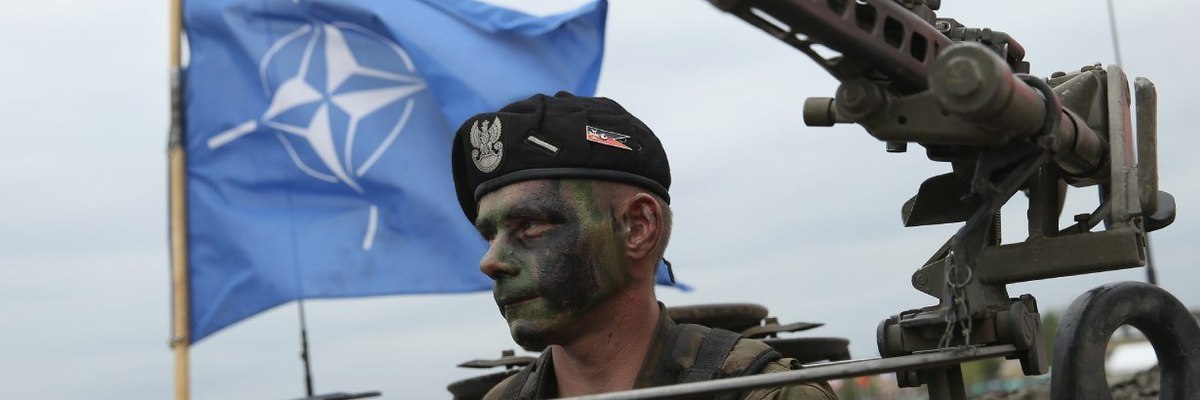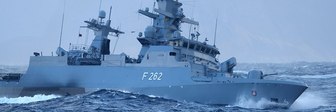It is thirty years since the Cold War between the Soviet Union and the west came to an end. The Soviet Union may no longer exist but when President Putin ordered the invasion of Ukraine he put the world on notice that his ambitions for a new Russian empire are real. The events of this past week suggest that western leaders will not allow that to happen. Are we on the brink of the old Cold War being replaced by something even more frightening?
To most observers the effect of the various meetings this past week of European and Nato leaders is that the West has drawn a new Iron Curtain along its border with Ukraine. In the words of the blueprint signed off by Nato leaders after their summit, Russia has become 'the most significant and direct threat to Allies' security and to peace and stability in the Euro-Atlantic area'. By any standards this is a profoundly worrying time in the history of relations between the West and its old adversary. It is the first time Nato has approved a significant update in its approach to Russia since 2010.
The document the leaders agreed says: "We cannot discount the possibility of an attack against allies' sovereignty and territorial integrity." The secretary general of Nato himself, Jens Stoltenberg, said: “We face the most serious security situation in decades. We live in a world where we have actually got war going on in Europe with large-scale military operations... If this becomes a full-scale war between Russia and Nato, then we see suffering, damage, death, destruction at this scale, which is much, much worse than what we see in Ukraine.'
So much for the rhetoric. In practical terms Nato pledged to supply more weapons and military support to Ukraine, which was promised more air defence systems, drones and kit for troops. But not just Ukraine. There will be more military personnel, ships and aircraft on standby to defend Nato countries from the Baltic to the Black Sea. The United States will increase America's military presence in Europe significantly. Troops will be stationed permanently in Poland. There will be two extra destroyers at the US naval base in Spain and two new squadrons of F-35 fighters to Britain. At present there are some 40,000 Nato troops on high alert in the region. That will be increased more than seven-fold to 300,000.
On the UK’s part, Boris Johnson has promised Ukraine an extra £1 billion in military support. In broader terms he said Britain’s defence spending would rise to 2.5% of national income by the end of the decade. That would cost tens of billions in extra spending. It was needed, Johnson said, because the West is facing a 'very different era' following Russia's invasion of Ukraine. The Defence Secretary Ben Wallace had already said an extra 1,000 British soldiers will be on standby so they could be deployed to Estonia in days and join the 2,000 already there. More Typhoon aircraft will be sent to Cyprus, while an aircraft carrier and its escort ships will be offered to Nato. Surveillance planes could also be used in the Black Sea if shipments of grain restart from Ukraine's ports.
The effect of all this is intended to have Vladimir Putin quaking in his boots – or, at least, force him to think again about his ambitious plans for a re-born Russian empire. Sceptics say it will do neither. Some fear that it risks a third world war with the unimaginable horror of a crazed Putin pressing the nuclear button. Others claim it does not go far enough.
In Britain’s case, for instance, the critics say it is ludicrous for Johnson to recognise the threats posed by an insurgent Russia while at the same time pursuing the government’s policy of reducing the size of the British army by 10,000 troops by 2025. One of those sceptics is the man who has just been appointed as the most senior military officer in the land, the chief of the general staff, General Sir Patrick Sanders.
Only two weeks after his appointment Sir Patrick had spelled out publicly how he saw the threat from Putin. He described it as our “1937 moment, when Britain and its allies needed to rearm to deter Moscow or risk being drawn into a wider war against Russia in future. Yet current defence spending plans envisage the size of the army being cut by 10,000 to 72,500, its smallest since the Napoleonic wars. Reversing those cuts, he said, should be a priority. Nato plans to bolster the alliance's defences will “clearly add to strains on the armed forces.”
He said that Russian wars often started badly but "history has also shown us that armies that have tasted defeat learn more quickly," He said he had never seen such a clear threat to peace and democracy as Putin’s "brutal aggression" and soldiers and officers of all ranks must be prepared to "fight and win" to prevent the spread of war in Europe. Russia’s resilience meant it could suffer the loss of any number of campaigns, battles and engagements but then "regenerate and still ultimately prevail". Given President Putin's ambition to restore the lands of "historic Russia", any respite would be "temporary and the threat would become even more acute" after Russia replenishes its capabilities following defeats in Ukraine. He added: "We don't yet know how the war in Ukraine will end but in most scenarios, Russia will be an even greater threat to European security after Ukraine than it was before."
A similar message was delivered by the former deputy supreme Allied commander in Europe, General Sir Richard Shireff: “We are not only fighting for the eastern Donbas territory of Ukraine, we are fighting for the future of the rules-based international order.” He offered two “realistic outcomes” to the war in Ukraine. They were: “Either Ukraine's President Zelensky achieves his laudable goal of pushing Russian forces out of his country. Or, Putin will annexe territories in Ukraine's south and east, with Kyiv acquiescing under pressure from the West.” In both cases, he said, it will not be the end of the story.
This was his dark scenario: “Russia, a nuclear power, will regroup, rearm and reignite its lust for expanding what it perceives as its rightful empire. If unchecked, Putin will soon subjugate the rump of Ukraine, swallow Belarus into the motherland and force a land bridge through the Suwalki Gap, the border territory between Poland and Lithuania that separates the Russian exclave of Kaliningrad from Belarus. That, of course, would be an aggressive incursion into territory of Nato member states, which would trigger World War III. A hot war of this kind would credibly involve nuclear weapons. Russian forces have gamed this scenario in regular exercises for more than a decade, practising the partial or whole seizure of the Baltic states, and what might follow. They call it 'nuclear de-escalation' but to everyone else it's nuclear blackmail.”
His comments put him at odds with those ministers and defence officials who have downplayed Russia's military capability, partly because of the manpower and equipment it has lost since the Ukraine invasion began on February 24. On the final day of the G7 summit earlier in the week Boris Johnson himself had been sceptical about the possibility of what he called a wider war in Europe. He said: "I don't think it will come to that... Clearly we are working very hard to confine this to Ukraine. Putin and the Kremlin are going to try to widen the conflict and say that this is something to do between Nato and Russia . That is not it at all. This is about an invasion of an independent sovereign country. It is about the West and the friends of Ukraine giving them the support they need."
There remains, of course, the possibility of some sort of negotiated settlement with Putin. The former foreign secretary and Tory leader Lord Hague dismisses that scenario: “We know enough about Putin now to be sure that there is no sustained, durable peace deal to which he will put his signature or subsequently keep his word. From his actions in Syria and behaviour since seizing Crimea, it is clear that he offers peace talks as a seduction, a distraction and a trap, not as a solution. There is no shape or form that Ukraine can take as a thriving, independent nation with which he will ever be able to live.
“We therefore have to support Ukrainians in achieving the strongest possible position on the battlefields of their own country, without knowing how this struggle will develop or end. But we have to understand how difficult that is going to be for tens of millions of people and be very clear in our arguments. While some can make a case for peace with concessions, and others will argue for long-term justice, such arguments are futile. When faced with Putin, if we favour peace at the expense of justice we will end up with neither.”
So where do you stand? The only certainty in these uncertain times is that nobody beyond Putin’s inner circle - and perhaps not even they – can read their master’ devious mind. So are you fatalistic? Do you believe that all we can do is hope for the best and prepare for the worst? Or do you believe that it doesn’t much matter what we do: Putin is out of control and, anyway, has painted himself into a corner? In his warped view, anything is preferable to backing down so he has nothing to lose. In which case should we allow him to hold on to the territory he has already seized and hope he’ll be satisfied with that? Or should we say “enough is enough” and act accordingly? Even if that means risking a nuclear confrontation.
Let us know.









